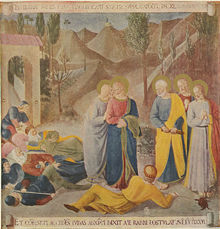Iuda Iscarioteanul
| Acest articol (sau părți din el) este propus spre traducere din limba engleză!
Dacă doriți să vă asumați acestă traducere (parțial sau integral), anunțați acest lucru pe pagina de discuții a articolului. |
Iuda Iscarioteanul a fost inițial unul din cei 12 apostoli, but is known for his betrayal of Jesus Christ. The Wednesday fast commemorates the sorrow at this betrayal, and it is one of the events commemorated in the services of Holy Thursday. His place among the apostles was taken by Matthias after a vote. He was the son of Simon Iscariot; Iscariot refers to his place of birth, Judea. The other apostles were all from Galilee. He is not to be confused with the Apostle Jude, brother of James.
Cuprins
Betrayal
Plot against Jesus
Judas agreed with the chief priests of the Jews to betray Jesus for thirty pieces of silver (cf. Matthew 26:14-16, Mark 14:10-11, Luke 22:1-6, John 13:2-3).
Mystical Supper
Jesus revealed at the Mystical Supper that Judas would betray Him, fulfilling the prophecy from the Old Testament. After the bread was blessed and broken, Judas left to fetch a guard to arrest Jesus (cf. Matthew 26:20-25; Mark 14:18-21; Luke 22:21-23; John 13:10-11, 18-29).
Arrest
After Jesus and His apostles had eaten the meal, Judas came with an armed crowd and betrayed Jesus with a kiss. Jesus allowed this because it was part of the burden He chose to accept (cf. Matthew 26:46-50, Mark 14:42-45, Luke 22:47-48, John 18:2-5).
Death
There are two accounts of Judas' death.
- Judas, remorseful, tried to return the money, but was refused, so he threw it into the temple. He hanged himself. The money was used to purchase a potter's field as a burial place for foreigners (cf. Matthew 27:3-10).
- Judas bought a field where he fell and died (cf. Acts 1:18-19).
Theological meaning
The betrayal of Christ was foretold in the prophets of the Old Testament, Jeremiah and Zachariah.
In the services of Holy Wednesday, Judas is contrasted with the sinful woman who anointed Jesus with costly perfume (Matthew 26:6-13).
In the prayers of preparation before receiving the Holy Eucharist, he is contrasted with the the thief who confessed Christ on the cross: "I will not reveal your mysteries to your enemies, neither like Judas will I betray you with a kiss, but like the thief on the cross I will confess you: 'Remember me, Lord, when You come into Your Kingdom.'"
External links
- Great and Holy Thursday (GOARCH)
- Bridegroom Services: Palm Sunday Evening through Holy Wednesday (GOARCH)
- "The Twelve Apostles" by Rev. George Mastrantonis (GOARCH)
